Creating a Safe Space for Conversations About Life Online
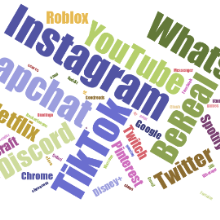
Over the years, Safer Internet Day has become a landmark event in the online safety calendar. Starting as an initiative of the EU SafeBorders project in 2004 and taken up by the Insafe network as one of its earliest actions in 2005, Safer Internet Day has grown beyond its traditional geographic zone and is now celebrated in approximately 170 countries worldwide.
This year Safer Internet Day fell within Children’s Mental Health Week, and we took the opportunity on Tuesday to highlight the main theme of this year's event: “Want to talk about it? Making space for conversations about life online”.
Safer Internet Day in the Primary Section
In the primary section, both Mr Harrison and Mrs Machemer ran discussion-based activities to engage students in thinking about their online life through sharing and talking about their technology milestones and sharing and reflecting on how they used technology at home. There were so many differences, and this sparked some lively and mature discussions. Below you can see some of the work they produced for these activities.

During the lessons, they also listened to and discussed the story Hanni and the Magic Window an online safety story without any technology!
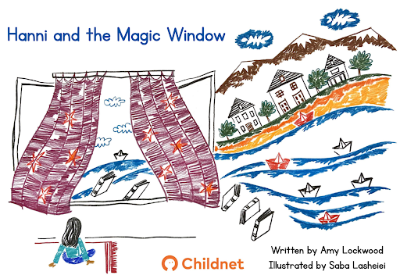
On Friday, Mr Harrison also ran an assembly where students gave their feedback on what concerns them most about online life and here are the results.
- Hackers & viruses
- Privacy (esp. camera & microphone)
- Scammers
- Spend real money by accident
- Chat with strangers
- Cyberbullying
- Seeing something scary or violent
- Screen time & addiction
Fig: Primary students most important online issues
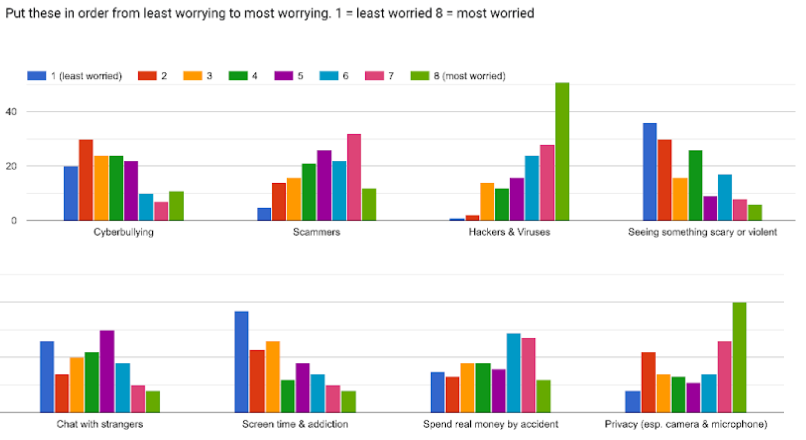 In the Portuguese Section Mrs Paula Nina put in place through many of the activities with students on https://www.seguranet.pt/ and as an activity they used the DALL·E 2 AI system to generate drawings on the security themes of:
In the Portuguese Section Mrs Paula Nina put in place through many of the activities with students on https://www.seguranet.pt/ and as an activity they used the DALL·E 2 AI system to generate drawings on the security themes of:
- Trojan Horse
- Ransomware
- Keylogger
- Spyware

Safer Internet Day in the Secondary Section
During tutor time students in the Secondary Section, using resources developed by Ms Marques, were given a presentation outlining the key highlights of the day and we also sent out a questionnaire that gave students the opportunity to tell us what issues really matter to children and young people, what changes they want to see and for them to give us their thoughts on how we can all work together to advocate for them moving forward?
From the feedback received, we were able to find out a range of information, such as their favourite app, which held no real surprises with the ongoing internet favourites making a showing. BeReal is probably the fastest-growing newcomer being founded in 2020 and rapidly gaining popularity during 2022. For those of you who want to find out more about this app, CommonSenseMedia has a few useful facts.
Fig: Y7-13 Student's favourite app
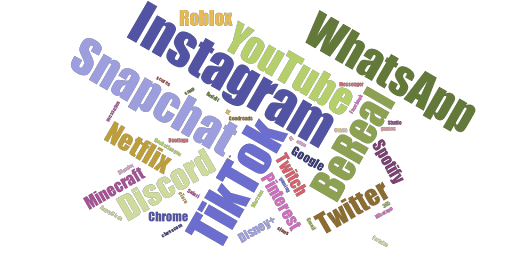
Students in Years 7-13 continue to use Google as their main search engine. It is good to see many of our students using Google Scholar, EBSCO and JSTOR for their search as these are search databases that can give access to higher quality peer-reviewed articles.
Interestingly ChatGPT is making its appearance with students, much like the rest of the world. We have already started teacher-led courses investigating the use of ChatGPT and AI to develop students' higher-order thinking skills and help create personalised learning pathways. We are also looking at how we can reliably detect the improper use of Chat GPT as part of our revision of the Academic Honesty policy.
Fig: Y7-13 students' favourite search tools
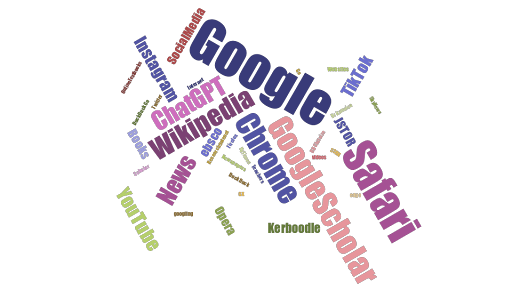
From the survey, the top four online issues that matter to students in Years 7-13 are:
- Online bullying
- Fake news and misinformation
- Excessive time spent online
- Scam emails and messages
It is good to note that students are aware of a range of ways to stay safe and protect themselves online through the use of VPNs to not sharing personal information online.
Fig: Year 7-13 most important online issues

When asked what they think internet industries can do to tackle these issues, the recurring theme is better management of account blocking, better enforcement of age ranges and for the companies to be more proactive in preventing misinformation on their sites.
Despite their strong knowledge of technology and the maturity and ability to make good decisions that have been demonstrated in the survey and throughout the school day, we should recognise that teenage brains are still developing and, as a result, they may be more likely to make impulsive or misguided decisions in certain situations, including those that occur online. This is due to the fact that the part of the brain responsible for decision-making, impulse control, and planning is still developing and maturing during the teenage years. This can lead to a heightened risk of poor decision-making in areas such as social media usage, cyberbullying, and online safety. Therefore, in line with the theme of Safer Internet day, it is important for parents to engage in frequent and open communication with their teens to help educate and guide them towards making informed and responsible choices in the digital world. By doing so, parents can play a vital role in promoting their child's well-being and ensuring their safe use of technology.
CommonSenseMedia offers some useful family planners to help guide conversations and achieve equitable family agreements around the use of technology. There are some great resources available on the Safer Internet website for parents and carers.
We have also curated a range of practical and useful Digital Citizenship resources and information for parents on our Technology for Parents Website. It is worth noting that for parents of Primary students and younger Secondary section students, there is a breakdown of the minimum age requirements for online platforms.
Our next steps are to gather information from you as parents on how we can help support you better with technology and run a series of workshops later this year.
Mr Michael Brooke
Director of Technology


















.png&command_2=resize&height_2=85)











